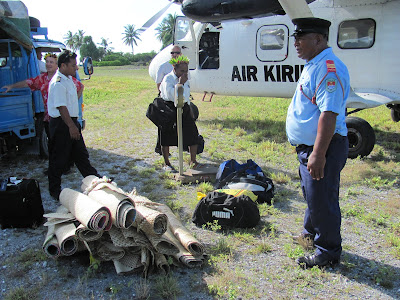 |
| Red Beach is in the foreground |
On November 20th - 23rd 1943, the US engaged the Japanese garrison in Betio on Tarawa in a bloody battle. There were approximately 3,600 Japanese military personnel and 1500 Korean labourers holding Tarawa when a force of 35,000 Americans attacked. It was a massacre by any standards and only 1 officer and 16 enlisted men of the Japanese force surrendered. The Americans lost 1700 men - many more than they predicted. The assault was badly planned, not accounting for a 'neap' or dodge tide in which the depth over the reef was miscalculated, leaving landing craft stuck on the reef and exposed at first light. The sight is named Red Beach reflecting the horrendous loss of life which occurred there.
According to Admiral Nimitz, "The capture of Tarawa knocked down the front door of the Japanese in the Central Pacific." The Americans went on to capture the Marshall Islands and other Japanese strongholds in the Pacific after this victory.
 |
| Ruins of a gun placement |
"Last week
some 2,000 or 3,000 United States Marines, most of them now dead or wounded,
gave the nation a name to stand beside those of Concord Bridge, the Bon Homme
Richard, the Alamo, Little Big Horn, and Belleau Wood. The name was Tarawa."
—Robert Sherrod, Time Magazine War
Correspondent, 6 December 1943. 































